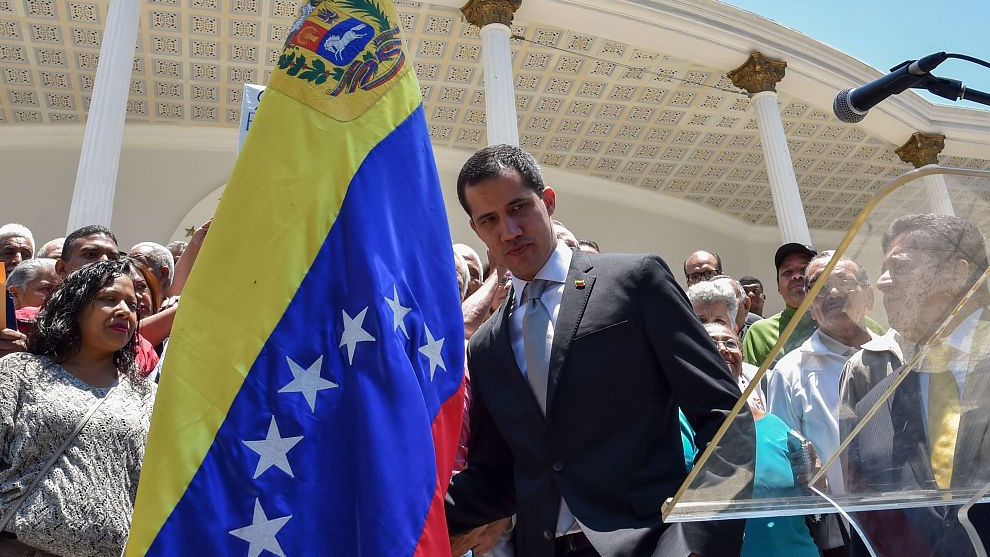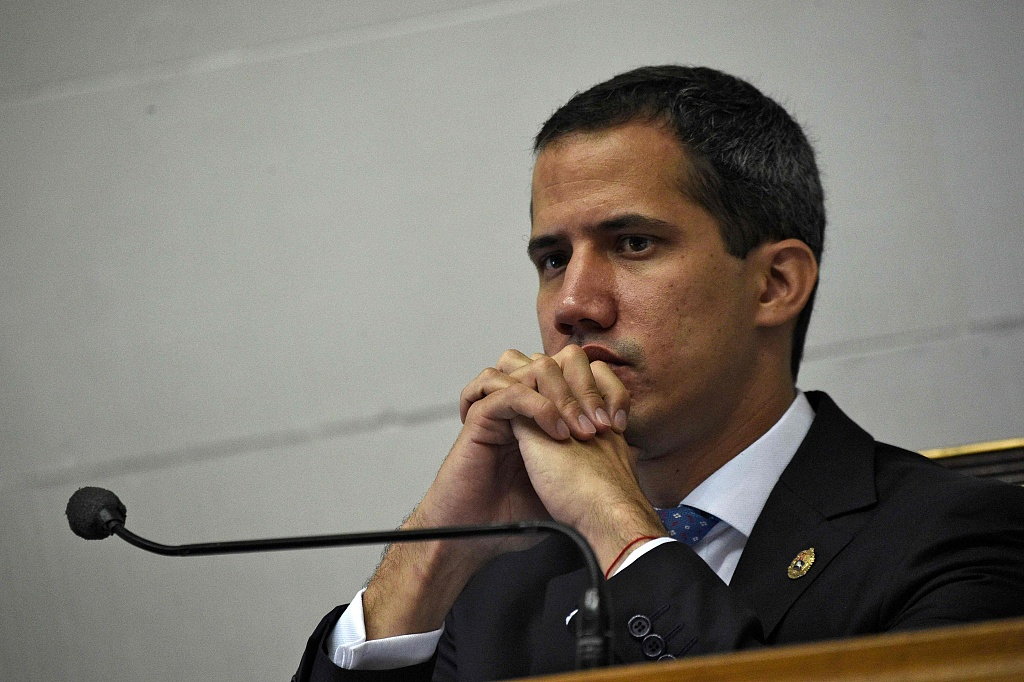
Opinion
16:43, 06-May-2019
Guaidó might as well stay inactive for a while
Pan Deng

Editor's note: Pan Deng is a member of the Academic Committee at the Charhar Institute and an executive director of the Latin America and Caribbean Region Law Center at the China University of Political Science and Law. The article reflects the author's opinion, and not necessarily the views of CGTN.
The 35-year-old Juan Guaidó Marquez, as a political leader, is incredibly young. He was fairly unknown among the international community, and even the vast majority of Venezuelans until six months ago. In a Bloomberg article titled "Venezuela's Moribund Opposition Stirs With Lawmaker's Emergence," which was published on January 15, "the new head of the National Assembly" was still described as "a little-known lawmaker."
However, his shooting to fame should not be too big a surprise in today's Western political landscape, which, since the financial crisis, has become increasingly fragmented, especially with rising populism. This trend has led to a number of young politicians taking the center stage of their national politics, such as the 39-year-old French President Emmanuel Macron, the 39-year-old former Italian Prime Minister Matteo Renzi, and the 38-year-old Estonian Prime Minister Juri Ratas.
The whirlwind of younger political leadership has also blown Latin America. In 2018, the 41-year-old Iván Duque became the youngest president in Colombia's history. His election was then followed by Carlos Quesada and Nayib Bukele, who, both born in the 1980s, won the presidential elections in Costa Rica and El Salvador respectively. And thus, it would appear that an era featuring young politicians including Guaidó is here.
Back in 2015, a coalition of opposition parties won the parliamentary election in Venezuela, after which, major political parties agreed to take turns to hold the presidential position in the National Assembly for a year. Guaidó's Popular Will Party, despite only winning less than one-tenth of the seats, took its turn to hold this position earlier this year.
However, People's Will Party had difficulty in finding a proper candidate. Politicians who stole the limelight during the election campaign were now either already in jail, fled abroad, or fell into disgrace due to various scandals. Leopoldo Lopez, once the leader of the People's Will Party and Guaidó's political mentor, was also under house arrest.
Against this backdrop, Guaidó was pushed to the front stage.
But what has happened over the past four months shows that he is far from being an effective leader.
To begin with, even though he was inaugurated on January 5 and seemed to be welcomed by quite a number of people in the country, it is important to note that leaders of other domestic parties have not responded to his defection plan so far.

Venezuelan opposition leader and self-proclaimed interim president Juan Guaido attends a session of the National Assembly in Caracas, April 9, 2019. /VCG Photo
Venezuelan opposition leader and self-proclaimed interim president Juan Guaido attends a session of the National Assembly in Caracas, April 9, 2019. /VCG Photo
On January 23, Guaidó also caught global attention when he proclaimed himself to be the acting president of Venezuela, the announcement of which has won the recognition from nearly 60 countries. But as the 60-day interim period - as he has misinterpreted the constitution - has run out, a fresh election is still far away, and Maduro is effectively dominating the country.
Other glorious moments for him were in March when he visited a range of countries as head of state and when he returned to Venezuela, many countries' ambassadors in Venezuela were waiting for him at the airport. Facing the crowd of supporters, he climbed up the scaffold and shook his fist to call on his supporters to take to the streets and continue the demonstrations. Today however, many countries, that initially recognized him, have refused to accept his ambassadors.
Last but not the least, not long ago, on April 30, what he called the "final offensive" turned out to be nothing more than staged filming and commotion orchestrated by him and his political mentor, with less than 100 armed men and several armored vehicles outside a military facility. The "greatest event in the history of Venezuela" that he "predicted" on social media ten days ago was merely a small coup and the government soon gained control of the situation.
In any case, Guaidó is well aware that his own power is dwarfed by other major political forces in Venezuela and thus he faces a balancing act between them. He is good at taking advantage of the information asymmetry to snatch some political gains among different interest groups.
But at the same time, he is also facing an uphill struggle to achieve his political ideals, as the young leader is getting more and more mired in a political drama directed by others.
Every action he initiated revealed a lack of ability in decision-making, mobilization, coordination and response. Therefore, it started with a bang and ended up in a mess. Obtaining international support and steering domestic public opinion by radical means may be an inevitable and common practice in Western political games where there is fierce party competition. However, a politician should never put personal interests above the well-being of the people.
Venezuela indeed needs changes now. Some people think that production should be resumed and people's livelihood should be improved first. Others believe that the country needs to return to the democratic track as soon as possible. However, the basic consensus is that another confrontation and polarization among the people should be avoided.
Guaidó might as well be "inactive" for a while and think more about the needs of the country and the interests of the people than his personal political gains. After all, he is still young. As long as he goes down the right road, he will have more chances to win in the future.
(If you want to contribute and have specific expertise, please contact us at opinions@cgtn.com.)

SITEMAP
Copyright © 2018 CGTN. Beijing ICP prepared NO.16065310-3
Copyright © 2018 CGTN. Beijing ICP prepared NO.16065310-3